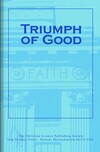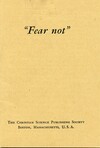

Are you sure?
This bookmark will be removed from all folders and any saved notes will be permanently removed.
The Truth about Adversity
There was once an individual who refused to be discouraged. One thing after another in his human affairs "went wrong," as the saying is; one disaster after another came upon him, apparently unjustly and through no fault of his own; but no matter what happened, he kept his poise. In fact, his manner of dealing with each seeming adversity was such that he actually succeeded in turning it into a blessing not only to himself, but to all with whom he was associated. He evidently had unshakable faith in the ultimate triumph of right, this Hebrew lad Joseph, of long ago, whom the compelling hand of Love took from feeding his father's sheep to make of him the greatest influence for good in what was at that time the most powerful kingdom in the world. No matter how acute the condition became, he evidently made no complaint. No matter how hopeless the situation might seem, his courage did not fail. He simply trusted God, and did the best he could.
It is a beautiful story, and vibrant with interest to the Christian Scientist today, for it illustrates how every adverse circumstance, if taken rightly, can be turned into a new opportunity to prove the truth of the Scriptural saying that "all things work together for good to them that love God." Did his brethren, inflamed with envy and jealousy, cast him into a pit in the wilderness? It all worked together for good, for he was presently sold to merchantmen and carried into Egypt, which brought him just that much nearer to the great work of his life. True, he was only a slave there, but that did not dishearten him. All things were still working together for good, and he quietly went about his business, doing the best he could. The sudden transition from his simple home in the land of Canaan to the house of Potiphar, the rich Egyptian, did not confuse him, nor rob him of his poise. He performed the duties required of him in his master's household, undisturbed by the fact that he was a captive in an alien land, and untouched by the gross materiality about him.
This same fidelity of purpose, this same integrity of thought and conduct which had so aroused the hatred and envy of his brethren, once more enraged the carnal mind, and impersonal evil found a new channel through which it hoped to accomplish his downfall. On a false accusation he was thrown into prison. There is no record, however, that he indulged in self-pity, self-righteousness, resentment, or bitter condemnation, nor did he spend precious time in bemoaning his fate, so far as we know. He still believed in his God, and that all things were still working together for good. Did it seem to human sense that his usefulness was over, that his work had been taken from him? Not so. The work he had been doing had undoubtedly been taken from him, but that only meant that another work was just beginning. If he could no longer do the big things for his master, which he had been doing so faithfully and well, he could still do little things for his fellow prisoners, and do them just as faithfully and just as well. Perhaps he had already learned that it is not the size of the things done which counts so much, as the spirit in which they are done.
Enjoy 1 free Sentinel article or audio program each month, including content from 1898 to today.
JSH Collections
This article is included in:
2007 - PAMPHLET
Triumph of good
This article is included in:
2007 - ANTHOLOGY
Anthology of classic articles
This article is included in:
1943 - PAMPHLET
"Fear not"
This article is included in:
1941 - PAMPHLET
The truth about adversity
JSH-Online has hundreds of pamphlets, anthologies, and special editions for you to discover.

February 1, 1941 issue
View Issue-
The Truth about Adversity
LOUISE KNIGHT WHEATLEY COOK
-
Meeting Goliath with Understanding
NEWTON T. BURDICK
-
Being Rightly Active
LINA ROOS SCHRADER
-
"The light of the world"
HELEN CARLYLE MITCHELL
-
"Bring forth the best robe"
JOHN MURRAY BURRISS
-
"Those who have named the name of Christ"
MARTHA BEMAN
-
God's Promise
NORAH M. COSTERTON
-
All Christian churches have one foundation, the Bible,...
Floyd C. Shank,
-
In Samfundsliv recently there was a very interesting...
Nils A. T. Lerche,
-
"Truth Lover" challenges the apostolic nature of the...
Lt.-Col. Robert E. Key,
-
Omnipotence
ROBIN A. WALKER
-
Spiritual Building
Grorge Shaw Cook
-
The Adequacy of Man
Evelyn F. Heywood
-
The Lectures
with contributions from Margaret E. R. Waite, Frank B. Morgan, Violet M. Law
-
Because of the numerous blessings God has bestowed...
Lloyd R. Jack
-
In grateful acknowledgment of God's loving care, and...
Louise Suttle
-
Christian Science came to my attention in 1911
I. Bert Loeser
-
Although I had a testimony in The Christian Science Journal...
U. Eleanor Wessel
-
Many years ago Christian Science came into our home...
Florence A. Fonda
-
"Come to Zion with . . . everlasting joy"
VERA CONSTANCE HOWARD
-
Signs of the Times
with contributions from H. T. M., E.B. Kennison, T. Oliver Edwards, William E. Gilroy





